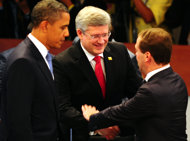Canada enters Pacific trade talks

Harper, who is attending an Asia-Pacific summit in Hawaii, on Sunday told reporters that Canada would formally indicate its interest in joining the negotiations on the Trans-Pacific Partnership, or TPP.
"We are indicating today our formal intention," Harper told reporters in Honolulu. "We are expressing our formal intention to join the Trans-Pacific Partnership."
Harper later met with US President Barack Obama, who welcomed Canada's interest in the TPP and discussed how to meet the future pact's "high standard for trade liberalization," according to a White House statement.
The TPP was launched in 2005 as an obscure agreement linking Brunei, Chile, New Zealand and Singapore, but Obama after taking office suddenly turned the agreement into the cornerstone of his trade policy.
The Obama administration has cast the TPP as a new 21st-century brand of trade agreement that ensures strict labor and environmental standards and lays down the rules for trade in the fast-growing Asia-Pacific region.
Harper said that Obama, in his talks ahead of Sunday's full Asia-Pacific Economic Cooperation (APEC) summit, "was very strongly indicating that he would like to see Canada join the Trans-Pacific Partnership."
Canada considered "the criteria actually set by the partnership and they're all criteria that Canada can easily meet, so it is something that we're interested in moving forward on," Harper said.
Canada already has a free trade agreement with the United States, along with Mexico, under the landmark North American Free Trade Agreement that took effect in 1994. Mexico also said it will enter the TPP talks.
But Japan's entrance into talks has given new momentum to the TPP, which would be the world's largest free trade area and cover more than one-third of the global economy.
The countries now involved in TPP are Australia, Brunei, Chile, Japan, Malaysia, New Zealand, Peru, Singapore the United States and Vietnam.
Canada has previously expressed interest in the TPP but faced opposition from New Zealand which insisted that Ottawa liberalize its dairy industry. Under the TPP rules, any country in the talks can block another entrant.
New Zealand is the world's largest dairy exporter, while Canada tightly manages its dairy farmers to control supply and demand.
The presence of New Zealand has also fueled opposition in the United States, where some lawmakers from farm states have vowed to fight the TPP.
Japan's main farmers' cooperative is also adamantly opposed to the TPP, fearing that foreign imports will swamp its historically protected industry.
But Prime Minister Yoshihiko Noda announced Friday on the eve of the Hawaii summit that he would join the TPP talks, hoping to ensure that the world's third largest economy is not left behind from regional integration.
The main outlier is China, where state-run media have accused the United States of using the TPP to counterbalance the rising Asian power.
Despite the spurt in interest in the TPP, most experts believe it will be years before it can come to fruition. The pact has also come under fire from consumer activists who say its provisions are vague and could primarily benefit corporations.
What the stars mean:
★ Poor ★ ★ Promising ★★★ Good ★★★★ Very good ★★★★★ Exceptional
 Tag:
Tag:
Related Contents
Latest News
More News
- Russian President congratulates Vietnamese Party leader during phone talks (January 25, 2026 | 09:58)
- Worldwide congratulations underscore confidence in Vietnam’s 14th Party Congress (January 23, 2026 | 09:02)
- Political parties, organisations, int’l friends send congratulations to 14th National Party Congress (January 22, 2026 | 09:33)
- 14th National Party Congress: Japanese media highlight Vietnam’s growth targets (January 21, 2026 | 09:46)
- 14th National Party Congress: Driving force for Vietnam to continue renewal, innovation, breakthroughs (January 21, 2026 | 09:42)
- Vietnam remains spiritual support for progressive forces: Colombian party leader (January 21, 2026 | 08:00)
- Int'l media provides large coverage of 14th National Party Congress's first working day (January 20, 2026 | 09:09)
- Vietnamese firms win top honours at ASEAN Digital Awards (January 16, 2026 | 16:45)
- ASEAN Digital Ministers' Meeting opens in Hanoi (January 15, 2026 | 15:33)
- ASEAN economies move up the global chip value chain (December 09, 2025 | 13:32)




















 Mobile Version
Mobile Version